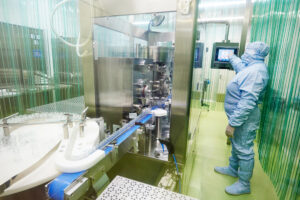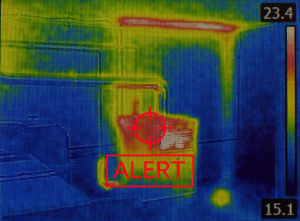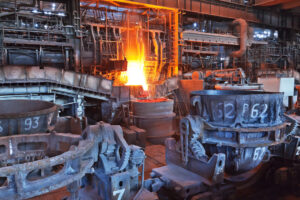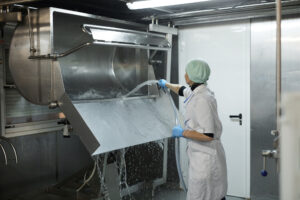Security in industrial environments is a big deal—no one wants their raw materials or intellectual property stolen—and cameras play a big role in maintaining facility security. But industrial cameras are more than security guards. They do so much more than just keep a watchful eye on the place.
Let’s explore how the right video monitoring system can improve operations, safety, and more in your facility.
Industrial Cameras: On the Job
After more than five decades of working with industrial plant managers to install and maintain their video monitoring systems, we know for a fact that security is just the icing on the cake. The real “cake,” the core benefits of industrial cameras, lie elsewhere. Here are five ways industrial camera systems go beyond security.
1. Process Optimization
Industrial cameras capture detailed footage of operations, allowing remote operators or supervisors to spot inefficiencies. Video monitoring can help streamline workflows, reduce the need for manual checks, and enhance overall efficiency. They are especially beneficial in industries where precision is key.
Video monitoring systems improve processes by providing actionable insights that lead to more efficient resource allocation, energy savings, and improved output quality.
2. Monitoring Hazardous Areas
In any industrial setting, there are dangerous zones where safety is paramount. Think of hazardous material storage or high-traffic areas where accidents are just waiting to happen. Industrial cameras can monitor these locations 24/7, providing real-time data on safety compliance and environmental conditions.
If something goes awry, like a leak or a spill, a remote operator watching the live feed can alert personnel immediately, allowing for a quick response and remediation. With an industrial camera system in place, it’s like having a safety net that never sleeps.
3. Training and Best Practices
Not everyone learns best from a textbook. Sometimes, seeing is believing—and that’s where industrial cameras come in for training purposes.
Capturing training sessions allows new employees to see best practices in action. These recordings can be analyzed and used to refine safety procedures or demonstrate how to operate complex machinery safely.
4. Keeping an Eye on Quality
An industrial camera system is a helpful eye when it comes to quality control. These cameras are tasked with monitoring product quality in real-time, ensuring that everything from the tiniest widget to the largest equipment is up to snuff.
With advanced imaging capabilities, remote operators can use industrial camera systems to detect defects or irregularities faster than you can say “quality assurance.” So next time you marvel at a flawless product, give a nod to the camera quietly working behind the scenes to ensure perfection.
5. Remote Monitoring
Industrial cameras have been a game-changer for multi-facility operations. Instead of having supervisors drive or fly from facility to facility across the country, they can check in on things from a single location.
The same goes for external folks like inspectors and equipment manufacturers. Inspectors can review the footage when reviews come up or if there are safety or operational concerns. Support personnel from manufacturers can also access the feed to see any equipment issues going on and offer troubleshooting from afar.
This reduces your personnel costs and, at the same time, improves efficiency. You can address issues in real-time, all without traveling or adding expenses.
Not All Industrial Cameras Are Built the Same
To reap the benefits above, you have to look beyond off-the-shelf cameras. A camera built for a retail space isn’t going to hold up in harsh industrial environments.
For industrial environments, the cost of ownership is lower for ruggedized cameras. Why? Because you don’t have to replace them every couple of months.
Industrial cameras are built to withstand harsh environments, moisture, debris, high levels of vibration, and more. Besides resilience, these cameras come with the added benefit of an uninterrupted feed.
There will be no gaps in your monitoring so you will always have the full picture of what’s going on across your entire plant.
Not sure how to choose the right industrial cameras for your facility? You don’t have to do it alone. At Opticom, we’re not just selling cameras—we’re making sure that you have the right video monitoring system.
This means that all the systems come with personalized advice from our consultants. Reach out.







